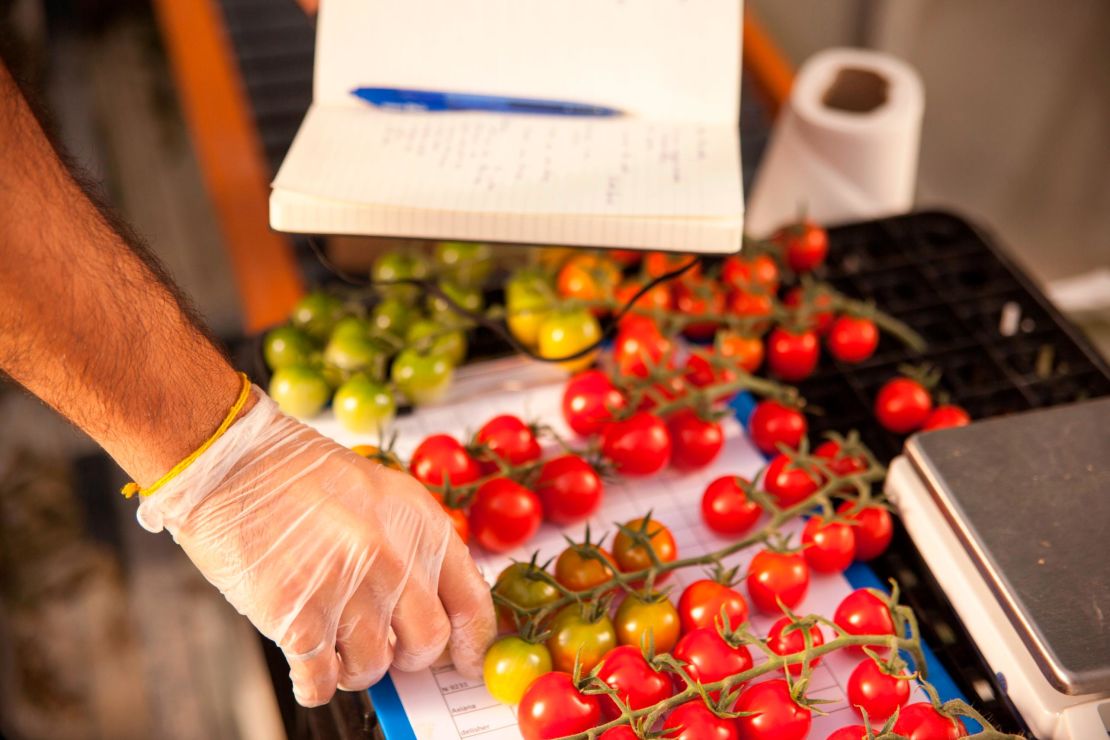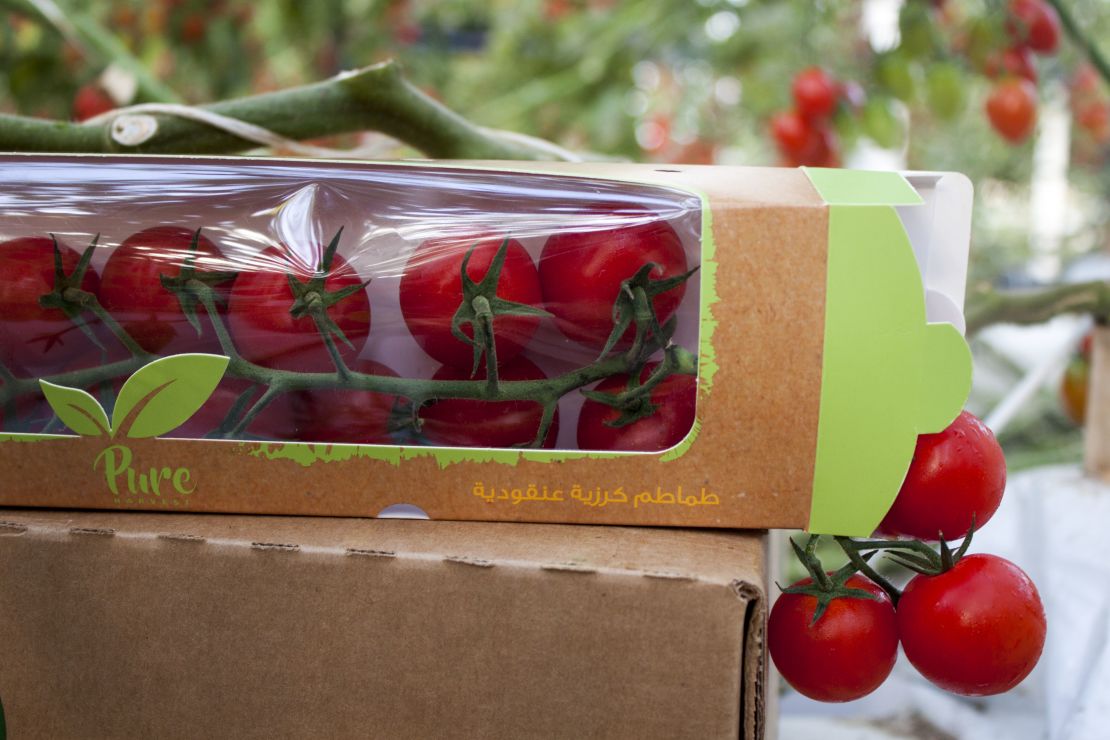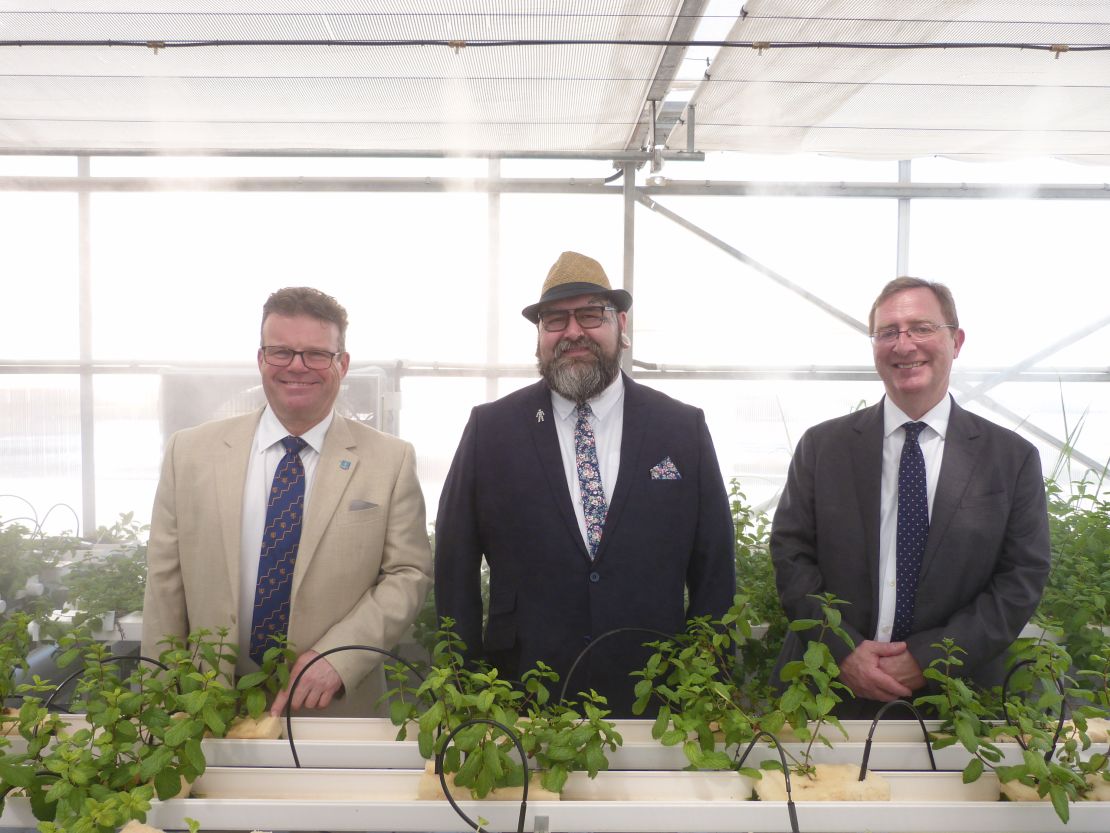The annual GITEX trade show in Dubai is a celebration of all things technology, traditionally dominated by displays of innovations such as intelligent robots and flying vehicles.
It is also a real-life social networking site for ambitious entrepreneurs seeking partners and buyers, such as Sky Kurtz, CEO of United Arab Emirates agritech start-up Pure Harvest.
Attending trade shows is expensive and offers no guarantees, says Kurtz, but he believes the trip this year was worth his while.
“I think it was a success,” he tells CNN. “We made contacts, and potentially a partner in Saudi Arabia.”
Pure Harvest had already secured more than $7.5 million in financing. Now the company is pursuing an ambitious international expansion plan that will require investment on a new scale.
The three-year-old start-up is aiming for nothing less than a transformation of the agriculture industry, and to resolve the growing threat to food security that faces the UAE.
Climate control
A desert climate with temperatures topping 50 degrees Celsius poses severe challenges for farming.
As a result, the UAE imports around 90% of its food, which is expensive, inefficient, and environmentally damaging.
There is also a threat that as the effects of climate change bite around the world, harvests in traditional producer countries are becoming less reliable, which could threaten their ability to sustain exports that the Emirates rely on.
Pure Harvest intends to resolve these problems through the creation of climate-controlled greenhouses that offer optimal conditions for growing fruit and vegetables on a year-round basis.
The company, founded in 2016, has already established a one-hectare facility - the size of a soccer pitch - in the Abu Dhabi desert which produced its first crop of several varieties of tomatoes in November 2018.
The warehouse has since been producing around two tons of tomatoes a day, which are retailing for around $2 (8 dirhams) for 300 grams.

The team, which also includes entrepreneurs Mahmoud Adi and Robert Kupstas, was informed by similar greenhouse initiatives around the world such as Sundrop Farms in Australia, which delivers more than 15,000 tons of produce a year in desert conditions.
Pure Harvest’s system works by controlling the greenhouse climate through a combination of mechanical and evaporative cooling systems – the latter converting humidity into water that feeds the produce. The plants are grown in a nutrient bath instead of soil.
Conditions are also maintained through sensors that helps to control variables such as temperature and light.
Chief Operating Officer Bina Khan says the technology is more advanced than other growing systems in the Gulf region.
“The climate control system not only serves to maintain the most optimal growing conditions for our plants but it also keeps insects and diseases from breaching the growing area as air escapes from the rooftop vents at (high) pressure,” she says.
Scaling up
For the next stage of its development, Pure Harvest must secure a far higher level of investment.
“Now that the proof of concept facility has proven a success, the team is now focused on raising capital to expand into additional produce, and into the greater GCC region including Saudi Arabia,” says Khan.
Having demonstrated the ability to produce tomatoes, the company now intends to branch into cucumbers, aubergines, and other vine crops.

Pure Harvest is also planning to launch several new, large-scale facilities – starting with a 4.5 hectare site in the UAE and a six hectare site in Saudi Arabia. This labor-intensive undertaking involves land acquisition, design and engineering work, and hiring specialist staff.
Most crucially it requires funding. The team are aiming to raise $160-180 million for multi-year expansion that will eventually bring them to a total of 50 hectares for cultivation.
Ultimately, the company hopes to establish a “Hilton Model” - inspired by the hotel chain - of owning some high-value facilities and outsourcing the rest, providing expertise and services to franchise clients.
The hope is that Pure Harvest greenhouses will spread beyond the Gulf to go worldwide.
‘On the precipice’
There is growing interest in the smart greenhouse model for farming in the Middle East - the Sahara Forest Project has launched initiatives in Tunisia and Jordan - and some scientists believe they could offer scalable solutions.
Dr. Duncan Cameron, a professor of soil and plant biology at the University of Sheffield, and his colleague Dr. Jacob Nickles recently designed a sensor-filled greenhouse to cultivate crops in Oman with support from the British and Omani governments.
As with Pure Harvest, the academics used a soil-free system – in their case through an innovative foam base – which Cameron believes is critical to the success of any such venture.
“Horticultural crops are generally grown from the highest-quality soils and those are degrading at the fastest rates…so we have a shrinking resource,” he says. “(Further) in the Middle East soils have been incredibly degraded by agriculture and climate change so they are essentially unusable in a lot of places.”

The professor adds that he is seeing greater buy-in from governments for the development of smart greenhouse models and that they are “getting viable” from a business perspective.
“We are teetering on the level of where this makes sense for capital investment purely for profit,” says Cameron. “Whether they (smart greenhouses) are cheap enough for mass market commercialization…I would say we are right on the precipice.”
But there are ongoing flaws to iron out, he adds, such as the amount of power required to operate such facilities, which can incur a high financial and environmental cost.
Pure Harvest is currently not using a sustainable power source but is in talks over an imminent switch to a solar or hybrid model.
Cameron believes further advances are also required in sensor technology to minimize wastage in the system, such as in determining the precise quantities of nutrients plants receive.
National priority
The good news for Pure Harvest is that their mission is shared by the Emirati government.
In November 2018, the UAE’s Minister of Food Security Mariam Hareb Almheiri announced a National Food Security Strategy intended to make the country the most food secure in the world by 2051.
The Ministry subsequently launched 10 accelerator programs for agriculture technology, offering loans and technical support to entrepreneurs in the field.
“The UAE is actively promoting the adoption of the latest research and technology as part of its National Food Security Strategy,” Almheiri said in a recent interview with the Oxford Business Group.
The accelerators “aim to establish ag-tech in the UAE by introducing and fostering sustainable technologies to promote agriculture in marginal environments,” the minister added.
There have been further steps since the announcement; with Abu Dhabi unveiling a package of incentives for agri-tech companies, and Dubai launching the Food Tech Challenge - a $1 million prize fund for food production innovations.
The country has also seen the launch of several innovative new smart farm concepts such a vertical farm at Dubai International Airport and a climate-controlled tomato farm in Al Ain.
Pure Harvest’s desert greenhouse might just be a vision of the future.














